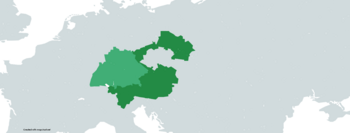German Austria (Deutscher Bund)
| |
|---|---|
| 1919–1940 | |
Reichsadler (Coat of Arms)
| |
Anthem:
| |
 Territory of German Austria, including the illegally seized Lower Silesia and Upper Silesia. The rest of the territory of the South German Federation is labeled in lighter green. | |
| Status |
|
| Capital and largest city | Vienna |
| Official languages | German |
| Common languages | German, Italian, Czech, Slovene |
| Demonym(s) | Austrian |
| Government |
|
•
|
|
| History | |
• Established | 10 September 1919 |
• Annexation | 2 February 1940 |
| Currency |
|
German Austria, (from 1930 the State of Austria) was the name given to the predominantly German-speaking territories of the former Austrian Empire which formed following its partition. It formed out of the core of the German-speaking region of Cisleithania, and inherited much of its industry and railroads though suffered from a lack of arable land to support its metropolis and capital of Vienna.
The Republic- which it is often unofficially referred to, suffered from instability and economic depression since its creation in 1919. The incorporation of the industry-rich region of Silesia assisted with economic development however lack of economic security and the Great Depression resulted in an economic collapse which later saw it leave the short-lived South German Federation and a coup by the Austrofascist Engelbert Dollfuss, who established a corporatist and Austrian nationalist dictatorship in Austria until its annexation by the German Reich in 1940.
It was a founding member of the South German Federation, and in theory, its leading member- however its lack of control over its own government resulted in Bavaria taking over its position de-facto. It was economically integrated with the rest of the South German Federation, including sharing a common currency and allowing freedom of movement and business with the rest of the federation, until it seceded in 1930.